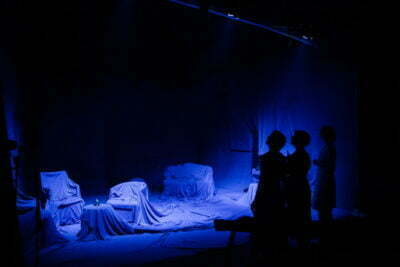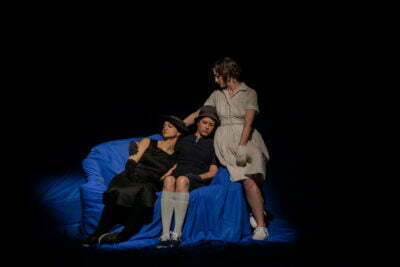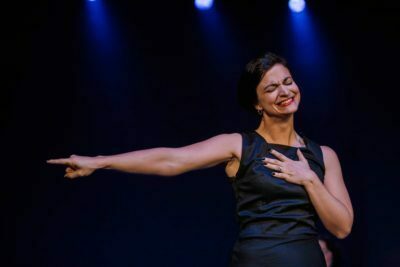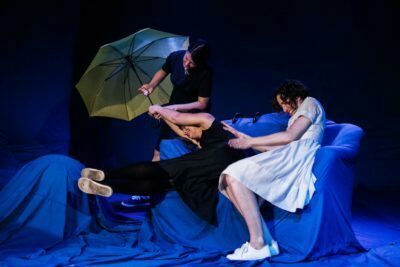3 Sisters
 Adapted by Earl H.E. Hill, Dan Christmann, and Andrej Visky
Adapted by Earl H.E. Hill, Dan Christmann, and Andrej Visky
From the play by Anton Chekhov
Directed by Andrej Visky
Produced by Theatre Y
Playing at the Humility Gallery, Chicago
A Showcase of Amazing Creativity Until it Stops Trying
As pointed out in Sideshow Theatre’s recent hit production of Stupid Fucking Bird and virtually every textbook on directing, Anton Chekhov is a master playwright whose tragicomedies about the Russian bourgeois easily ossify into self-parody and empty ritual in the wrong hands. (This can happen to any author, but Chekhov is the go-to example for some reason. Perhaps it’s because he’s among the world’s most-frequently produced playwrights despite having only finished five full-length plays.) In an attempt to restore the emotional power of the 1900 play Three Sisters, three adapters, Earl H.E. Hill, Dan Christmann, and Andrej Visky have rewritten it for Theatre Y with just the title characters. For the first half of the play, director Visky employs a wide array of non-naturalistic staging choices to bring out the emotional core of each character, as they navigate the place where experience becomes memory, which becomes pining for Moscow. It contains all the unexpected, original, and striking visuals audiences appreciate in Eastern European-influenced companies. Then, halfway through, the staging stops, and the sisters just monologue to the audience until the lights go down.

If you aren’t already very familiar with Three Sisters, this isn’t the production to learn it from, but a little reminder can’t hurt. Olga (Kevlyn Hayes), the eldest, is a schoolteacher, and the most pragmatic person in the family. Masha (Melissa Lorraine) is in a loveless marriage and mourning for her life, while youngest sister Irina (Katie Stimpson) is the object of a deadly romantic rivalry between men she is not interested in. Meanwhile, the sisters’ good-for-nothing brother has married an unsophisticated woman they all look down on, even though she is now running the house, and the sisters’ fortunes and social status are rapidly declining. Theatre Y’s adaptation begins with the sisters reliving the events of the play, but original dialogue is intermingled with quotations and plot points. At times, the sisters exaggerate their slightly melodramatic proclamations, but at others, their genuine desperation and idealism shines through.

Péter Szabó’s design and Michael Rathbun’s lighting are great assets of the staged portion of the play. From a red spotlight to represent Masha’s love, the colonel, to the evocative music ranging from Beethoven to Korobeiniki (the Tetris song), Scabó, Visky, and Rathbun have worked out a seemingly endless number of ways to keep the story fresh and focused on the characters’ inner monologues. Of course a symbol would be more potent that the thing itself, since the sisters all romanticize their soldier admirers and life back in the city. It’s a fun challenge for the audience to figure out when the sisters are re-living something, and when they are deliberately or subconsciously altering their recollections. A few times, they even acknowledge that they are trying to shape how they are perceived by each other, and by us.

Unfortunately, the play’s interesting presentation comes to an end long before the actresses stop talking. The monologues they deliver for about the last thirty minutes are little more than the adapters’ notes about each characters’ psychology, the same kind any director or actor would make in preparation for a show, or any student would make in a literature class. It’s a shame, too, because the three actresses worked very well together. Hayes understands Olga’s world-weary bitterness, Lorraine Masha’s flare for seeking attention, and Stimson Irena’s innocent selfishness. Several moments in the show neatly capture Chekhov’s difficult-to-grasp sense of humor. A few of the monologues are even interesting in their own right. But then, they just don’t stop, and really, each sister just has one monologue, split into chunks and intermingled with the other two’s, delivered while they stand still in a line, facing forward. I’m sure the adaptors could offer a very detailed explanation for why they did this, but ending a self-styled deconstruction with a recitation of an essay isn’t going to hold people’s attention.
Somewhat Recommended
Jacob Davis
Reviewed April 27, 2016
For more information, see 3 Sisters’ page on Theatre in Chicago.
Playing at the Humility Gallery, 564 W 18th St, Chicago. Tickets are $20, with discounts for students, seniors and industry. To order, visit theatre-y.com. Performances are at 7:00 pm every night through May 2, and then at 7:00 on Fridays and Saturdays through June 11. Running time is ninety-five minutes, with no intermission.

